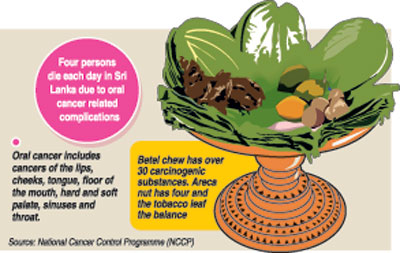News
Betel tobacco ban: Campaigners tell youths to spit out deadly mouthful
The ban on the age old practice of chewing betel came under heavy criticism by the public citing the double standards adopted by the government, which would not prohibit tobacco smoking.
Last week, the government banned smokeless tobacco through a gazette notice after it was approved in parliament in April 2017.
The manufacture, sale and possession of all smokeless tobacco products and mixtures that contain tobacco including the tobacco strips in the betel quid is banned. However growing, chewing betel, and selling betel leaves are not banned.
While organisations lobbying for a ban on smoking were cynical others were supportive as tobacco chewing (also termed smokeless tobacco), has become a major killer among youth.
National Authority on Tobacco and Alcohol chairman, Dr Palitha Abeykoon said that the problem arose when large amounts of smokeless tobacco products were detected in containers at the Colombo port and in huge packages at the Bandaranaike International airport.
A recent survey done by the World Health Organisation has revealed that 6% of school children are chewing commercially produced arecanut. It is learned that many of them are addicted and they use it for the high it can produce. “They keep the substance under their tongue,’’ Dr Abeykoon said.
The finding necessitated the ban on smokeless tobacco products, he said.
The aim is not to deprive the public of their traditional betel chewing habits but from using tobacco in the betel quid. The use of the ‘bulath vita’ goes back centuries. We do not want to interfere with it, but will not allow vendors selling betel advertising products,’ he said.
Often betel quid sellers and kiosks advertise on strips of cardboard announcing the availability of the betel quid in their stalls.
The Cancer Registry at the cancer hospital in Maharagama said 14.3% of reported cancer patients have oral cancer and every day three to four people die of the disease. It affects the lips, tongue, mucosa of the oral cavity, palate and the oesophagus.
The data also reveal that unlike traditional betel chewing, chewing smokeless tobacco is most dangerous and addictive, killing people within two years.
Consultant in Community Dentistry, Institute of Oral Health, Maharagama Dr. Hemantha Amarasinghe, said that the latest death was a young man in his early 30s who had been chewing the brand ‘mawa’ for two years.
The products that contain a mixture of arecanut, tobacco, sweeteners and spices come under different brand names including marva, haan, barbul and beeda in the markets. The product are from India, Pakistan and Bangladesh and are sold in sachets or attractively packed in compact yellow and red tins.
Interestingly, the product is banned in those countries that export them. Multinational companies who do not want to close down their businesses are finding new markets in Asia.
A survey done by the World Health Organization in 2015 has found that youth between the ages of 15 -19 years are into the habit of using smokeless tobacco. The ‘Global Youth Tobacco 2015’ survey in urban, semi urban and rural Sri Lanka found that 4.2% of the boys and 0.5% of the girls chew smokeless tobacco. The product has cancer-causing properties and the tobacco is more harmful than the arecanut.
The Centre for Combating Tobacco, Dr. Mahesh Rajasuriya said that people need to be educated on the dangers of the product and the importance of the ban. “The tobacco companies cannot be stopped. This is some progress in tobacco control,’’ he said.
Alcohol and Drug Information Center, director, Pubudu Sumanasekera opined that the ban was good but there should be no exceptions to the traditional bulath vita. “The pictorial warning on cigarette boxes has been successful, this will also be fruitful.’’
The key to success is to target demand and supply. “Also we need strict implementation of the law. People always find loopholes,’’ he said.
Dr Abeykoon said that the police have been advised about the laws. The police, excise officers, public health officers and officers from the Food and Drugs Authority will be empowered to monitor the ban. Also steps are being taken to educate the young generation of the dangers of chewing betel.

